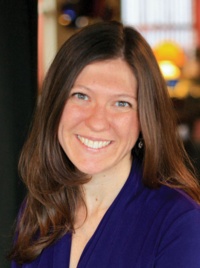Kim Klockow-McClain
As a student of both the atmosphere and the human systems that interact with it, I’m drawn to two challenges that I would be excited take on as an AMS councilor: first, shepherding our Society through a time of external change, and second, shepherding our Society through a time of internal change.
The AMS seeks to improve the world’s condition through advancing our sciences, technologies, applications, and services. To help our members find fulfillment in the efforts they pursue related to this goal, I feel strongly that our Society must develop and maintain strong connections with external groups that can help us grow in our understanding for the dynamic changes occurring around us. These groups can include other scientific and professional organizations, but also groups spanning private, academic, and public sectors that work in focused topical domains such as climate adaptation and natural hazards resilience. This is where my background as a geographer compels me to point out that all disasters, and all weather and climate impacts, are inherently local. That reality shapes my priority for the second challenge—that of our internal change as an organization.
To meet our mission at the local level, we must bolster our work within local chapters. I believe our local chapters can become the hands and feet of our Society in all the places they’re embedded—they can bring our science to the local forums where questions about resilience and adaptation are ultimately answered. With some coordination, the chapters could share resources, connections, and strategies for engagement. These kinds of activities could bring new life and meaning to our local chapters. I have raised this issue as one of my top priorities for the upcoming AMS Centennial, and I would be honored to bring this perspective into the work of the Council.
Kim Klockow-McClain
Kim Klockow-McClain is a research scientist and the societal applications coordinator for the Cooperative Institute for Mesoscale Meteorological Studies (CIMMS). She additionally serves as the group lead for the newly formed Societal Impacts Group within the National Severe Storms Laboratory (NSSL). Kim’s research applies behavioral science methods to address pressing issues in the management of weather and climate risk, especially in the communication of forecast uncertainty and response to hazardous weather warnings. In her other roles, Kim coordinates multidisciplinary research projects and works to build new capacity for the conduct and implementation of social scientific research.
Before joining CIMMS/NSSL, Kim worked for several years as a policy advisor for social scientific research at the NOAA Office of Weather and Air Quality outside Washington, D.C., where she served as the first social scientist in the office. In this role, she had the opportunity to coordinate with NSF, the National Academies of Science, congressional committees, the AMS Policy Program, partner academic institutions, the AAAS, and other NOAA line offices, including the National Weather Service.
Kim was the 2013/14 AMS-UCAR Congressional Science Fellow, and worked in the U.S. Senate on natural hazards mitigation and financing, water infrastructure, control and cleanup of environmental pollution, offshore oil and gas drilling, and fisheries management.
She completed her Ph.D. in human/hazards geography from the University of Oklahoma (OU) in 2013 and also holds an M.S. in professional meteorology from OU and B.S. degrees in economics and synoptic meteorology from Purdue University.
Kim is a member of the AMS Planning Commission and the AMS Centennial Committee, and serves as a cochair of the Societal Impacts Board. She previously chaired the planning committees for the Societal Applications Conference and the Student Conference.
